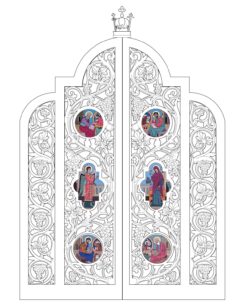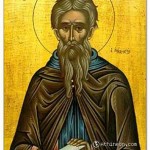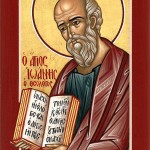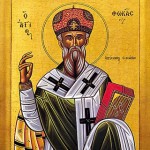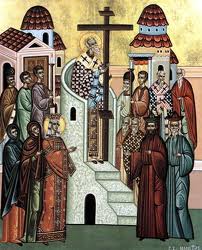Cyriacus was born in Corinth, to John and Eudoxia. His father John was a presbyter and Peter, Bishop of Corinth, was his kinsman. In his early youth, the bishop ordained Cyriacus a reader in the cathedral church. Reading the Holy Scripture, the young Cyriacus marveled at God’s providence: how God glorified all His true servants and how He arranged the salvation of the human race. At age eighteen, Cyriacus’s desire for the spiritual life led him to Jerusalem. There, he entered the monastery of a godly man Eustorgius, who gave him his first instruction in the monastic life. After that, he went to St. Euthymius, who foresaw that he would be a great spiritual father. He clothed him in the schema and sent him to St. Gerasimus at the Jordan, where Cyriacus spent nine years. Following the death of Gerasimus, he returned to the Monastery of St. Euthymius, where he remained in stillness for ten years. Then, fleeing the praise of men, he moved from place to place. He finally lived a life of asceticism in the community of St. Chariton, where he ended his earthly sojourn of 109 years. A celebrated ascetic and miracle-worker, St. Cyriacus was massive and strong in body, and remained such in deep old age, despite strict fasts and vigils. In the wilderness, he sometimes ate only raw greens for years. He was very zealous for the Orthodox Faith, denouncing all heresies, especially that of Origen. He said of himself that, since he became a monk, the sun had neither seen him eat nor become angry with anyone. According to the Rule of St. Chariton, the monks ate only once a day, after the setting of the sun. Cyriacus was a great light, a pillar of Orthodoxy, the adornment of monks, a mighty healer of the sick, and a gentle comforter of the sorrowful. Having lived long for the benefit of many, he took up his habitation in the eternal joy of his Lord in the year 557. (Prologue of Ohrid)
 Continue reading September 29 19th Sunday after Pentecost, Octoechos Tone 2 Our Venerable Father Cyriacus the Anchorite
Continue reading September 29 19th Sunday after Pentecost, Octoechos Tone 2 Our Venerable Father Cyriacus the Anchorite
Day: 12 September 2013
September 26, 2013 Falling Asleep of John the Theologian, Apostle and Evangelist
John was the son of Zebedee the fisherman and Salome the daughter of Joseph, the betrothed of the Holy Theotokos. Called by the Lord Jesus, John immediately left his father and his fishermen’s nets and, with his brother James, followed Christ. From then on, he was not separated from his Lord until the end. With Peter and James, he was present at the raising of Jairus’s daughter and the Transfiguration of the Lord. At the Last Supper, he inclined his head on Jesus’ breast. When all the other apostles had abandoned the crucified Lord, John and the Holy Mother of God remained beneath the Cross. In obedience to the Lord, he was as a son to the Holy Virgin Mary, and carefully served and watched over her until her Dormition. After her Dormition, John took his disciple Prochorus to preach the Gospel in Asia Minor. He lived and labored mostly in Ephesus. By his inspired preaching and miracles he converted many to Christianity and shook paganism to its foundation. The embittered pagans bound him and sent him to Rome, to face Emperor Dometian. Dometian had him tortured and flogged, but neither the bitterest poison he was given to drink, nor the boiling oil into which he was thrown, did him any harm. This terrified the emperor and, thinking him immortal, Dometian sent him into exile to the island of Patmos. There St. John converted many to Christianity by words and miracles, and confirmed well the Church of God. He also wrote his Gospel and Revelation on Patmos. In the time of Emperor Nero, who granted freedom to all prisoners, John returned to Ephesus, where he lived for some time, confirming the work he had begun earlier. He was over one hundred years old when he went to the Lord. When his disciples later opened his grave, they did not find his body. On May 8 of every year, a fine dust, fragrant and healing, rose from his grave. After a long, laborious and fruitful life on earth, this beloved disciple of Christ, a true pillar of the Church, took up his habitation in the joy of His Lord. (Prologue of Ohrid)
 Continue reading September 26, 2013 Falling Asleep of John the Theologian, Apostle and Evangelist
Continue reading September 26, 2013 Falling Asleep of John the Theologian, Apostle and Evangelist
September 22, 2013 18th Sunday after Pentecost, Octoechos Tone 1 Holy Priest-Martyr Phocas, Bishop of Sinope (98-117); Holy Prophet Jonah (786-46 BC) Venerable Jonah the Presbyter, Father of Theophanes, Composer of Canons Theodore the Branded
Phocas exercised himself in all the Christian virtues from his youth. As bishop in his birthplace, the town of Sinope on the shores of the Black Sea, he strengthened the faith of the true believers by his example and divine words and converted many idol-worshipers to the true Faith. The hard-hearted pagans were filled with rage against holy Phocas. Through a vision granted him by the Lord, he foresaw his martyrdom: Phocas saw a white dove fly down from heaven carrying a beautiful wreath of flowers in its beak, and lowered the wreath onto his head. And Phocas heard a voice, saying: “Your cup is full and you should drink it!” From this vision the God-pleaser realized that he was soon to suffer for Christ. He was not afraid, but with gratitude toward God prepared himself for suffering. Soon after, a certain prince, Africanus, took Phocas for interrogation, and subjected him to harsh tortures. The torturers beat and wounded his whole body, and after a time of imprisonment threw him into boiling water, where this brave soldier of Christ ended his earthly life and settled in the joy of his Lord. Phocas suffered during the reign of Emperor Trajan. (Prologue of Ohrid)

September 15, 2013 Sunday after the Exaltation of the Cross, Tone 8; Holy Great-Martyr Nicetas (374); Joseph, Bishop of Alavert in Georgia (570)
Nicetas was a Goth by birth. He was a disciple of Theophilus, Bishop of the Goths, who participated in the First Ecumenical Council [Nicaea 325]. When the Gothic prince Athenarik began to torture Christians, St. Nicetas stood before the prince and denounced him for his paganism and inhumanity. Subsequently harshly tortured, Nicetas confessed his faith in Christ even more strongly, and prayed to God with thanksgiving. His mind was unceasingly raised up to God, and on his breast under his robe he bore an icon of the Most-holy Theotokos with the Pre-eternal Christ Child standing and holding the Cross in His hands. St. Nicetas carried this icon because the Holy Theotokos had appeared to him and comforted him. Finally, the torturer threw the soldier of Christ into the fire, where the holy martyr breathed his last, but his body remained untouched by the fire. His companion Marianus took his body from the land of the Goths (Wallachia and Bessarabia) to the town of Mopsuestia, in Cilicia. There, he built a church dedicated to St. Nicetas, and placed the miracle-working relics of the martyr in it. Nicetas suffered and was glorified in the year 372. (Prologue of Ohrid) Continue reading September 15, 2013 Sunday after the Exaltation of the Cross, Tone 8; Holy Great-Martyr Nicetas (374); Joseph, Bishop of Alavert in Georgia (570)
Continue reading September 15, 2013 Sunday after the Exaltation of the Cross, Tone 8; Holy Great-Martyr Nicetas (374); Joseph, Bishop of Alavert in Georgia (570)
